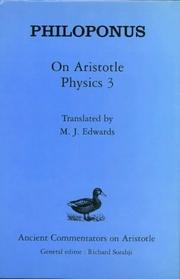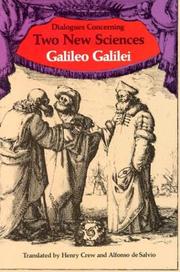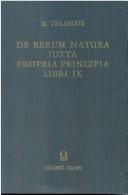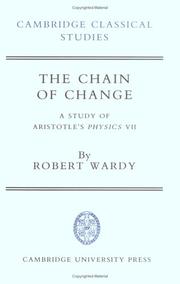| Listing 1 - 10 of 28 | << page >> |
Sort by
|

ISBN: 9780715626160 0715626167 Year: 2013 Publisher: London : Bloomsbury,
Abstract | Keywords | Export | Availability | Bookmark
 Loading...
Loading...Choose an application
- Reference Manager
- EndNote
- RefWorks (Direct export to RefWorks)
Aristote, --- Physica (Aristoteles). --- Aristoteles, --- Physics --- Physique --- Early works to 1800 --- Ouvrages avant 1800 --- Aristotle. --- Aristote --- Physics - Early works to 1800
Book
ISBN: 2865632598 9782865632596 Year: 1990 Publisher: Paris : Méridiens Klincksieck,
Abstract | Keywords | Export | Availability | Bookmark
 Loading...
Loading...Choose an application
- Reference Manager
- EndNote
- RefWorks (Direct export to RefWorks)

ISBN: 0486600998 9780486600994 Year: 1954 Publisher: New York, N.Y.: Dover,
Abstract | Keywords | Export | Availability | Bookmark
 Loading...
Loading...Choose an application
- Reference Manager
- EndNote
- RefWorks (Direct export to RefWorks)
Mechanics --- Physics --- Mécanique --- Physique --- Early works to 1800 --- Ouvrages avant 1800 --- Mechanics. --- Early works to 1800. --- Mécanique --- Mechanics - Early works to 1800 --- Physics - Early works to 1800
Book
ISBN: 3402030209 3402030217 3402030225 9783402030226 9783402030219 9783402030202 Year: 1993 Volume: 17/2 Publisher: Münster Aschendorff
Abstract | Keywords | Export | Availability | Bookmark
 Loading...
Loading...Choose an application
- Reference Manager
- EndNote
- RefWorks (Direct export to RefWorks)
Beginning --- Causation --- Physics --- Science, Medieval --- #GROL:SEMI-277'12' --- Beginning - Early works to 1800 --- Causation - Early works to 1800 --- Physics - Early works to 1800
Book
ISBN: 9780842527477 0842527478 Year: 2009 Publisher: Provo Brigham Young University Press
Abstract | Keywords | Export | Availability | Bookmark
 Loading...
Loading...Choose an application
- Reference Manager
- EndNote
- RefWorks (Direct export to RefWorks)
"Avicenna's Physics" is the very first volume that he wrote when he began his monumental encyclopedia of science and philosophy, "The Healing". Avicenna's reasons for beginning with "Physics" are numerous: it offers up the principles needed to understand such special natural sciences as psychology; it sets up many of the problems that take center stage in his Metaphysics; and it provides concrete examples of many of the abstract analytical tools that he would develop later in "Logic". While "Avicenna's Physics" roughly follows the thought of "Aristotle's Physics", with its emphasis on natural causes, the nature of motion, and the conditions necessary for motion, the work is hardly derivative. It represents arguably the most brilliant mind of late antiquity grappling with and rethinking the entire tradition of natural philosophy inherited from the Greeks as well as the physical thought of Muslim speculative theologians. As such, "Physics" is essential reading for anyone interested in understanding Avicenna's complete philosophical system, the history of science, or the history of ideas.
#GGSB: Filosofie (oudheid) --- Physics --- Avicenna, --- Science --- History --- Filosofie (oudheid) --- Science - Islamic Empire - History --- Physics - Early works to 1800 --- Avicenna, - 980-1037 - Shifā'. - Ilāhīyāt

ISBN: 3487040751 9783487040752 Year: 1971 Publisher: Hildesheim Olms
Abstract | Keywords | Export | Availability | Bookmark
 Loading...
Loading...Choose an application
- Reference Manager
- EndNote
- RefWorks (Direct export to RefWorks)
Philosophy of nature --- Aristotle --- Nature --- Nature, Philosophy of --- Natural theology --- Philosophy --- Aristoteles. --- Aristoteles --- Aristote --- Aristotile --- Aristotle. --- Philosophy of nature - Early works to 1800 --- Aristotle - Physics - Early works to 1800 --- Aristotle - Physics
Book
ISBN: 9780674996557 0674996550 9780674996564 0674996569 Year: 2011 Volume: 316, 317 15, 16 Publisher: Cambridge, Mass. ; London : Harvard University Press,
Abstract | Keywords | Export | Availability | Bookmark
 Loading...
Loading...Choose an application
- Reference Manager
- EndNote
- RefWorks (Direct export to RefWorks)
Problems, the third-longest work in the Aristotelian corpus, contains thirty-eight books covering more than 900 problems about living things, meteorology, ethical and intellectual virtues, parts of the human body, and miscellaneous questions. Although Problems is an accretion of multiple authorship over several centuries, it offers a fascinating technical view of Peripatetic method and thought. Rhetoric to Alexander, which provides practical advice to orators, was likely composed during the period of Aristotleʹs tutorship of Alexander, perhaps by Anaximenes, another of Alexanderʹs tutors. Both Problems and Rhetoric to Alexander replace the earlier Loeb edition by Hett and Rackham, with texts and translations incorporating the latest scholarship. -- Book jacket.
Science --- Physics --- Rhetoric --- Science, Ancient. --- Rhetoric, Ancient. --- Science, Ancient --- Rhetoric, Ancient --- Philosophy --- Science - Early works to 1800 --- Physics - Early works to 1800 --- Rhetoric - Early works to 1800 --- Oratory, Ancient. --- English poetry.
Book
ISBN: 3487074699 9783487074696 Year: 1984 Publisher: Hildesheim
Abstract | Keywords | Export | Availability | Bookmark
 Loading...
Loading...Choose an application
- Reference Manager
- EndNote
- RefWorks (Direct export to RefWorks)
Philosophy of nature --- Aristotle --- Science, Ancient. --- Physics --- Early works to 1800. --- Aristotle. --- -Science, Ancient --- Ancient science --- Science, Primitive --- Science --- Natural philosophy --- Philosophy, Natural --- Physical sciences --- Dynamics --- Early works to 1800 --- History --- Aristoteles. --- Aristoteles --- Aristote --- Aristotile --- Science, Ancient --- Physics - Early works to 1800. --- Aristotle. - Physics.

ISBN: 0521373271 9780521373272 9780521714709 0521714702 Year: 1990 Volume: *75 Publisher: Cambridge Cambridge University Press
Abstract | Keywords | Export | Availability | Bookmark
 Loading...
Loading...Choose an application
- Reference Manager
- EndNote
- RefWorks (Direct export to RefWorks)
The Chain of Change, first published in 1990, is a philosophical commentary devoted to Aristotle's Physics VII, in which Aristotle argues for the existence of a first, unmoved cosmic mover. This study systematically considers the major issues of the book.
Philosophy of nature --- History of physics --- Aristotle --- Physics --- Physique --- Early works to 1800 --- Ouvrages avant 1800 --- Aristotle. --- Science, Ancient. --- Early works to 1800. --- -Science, Ancient --- Ancient science --- Science, Primitive --- Science --- Natural philosophy --- Philosophy, Natural --- Physical sciences --- Dynamics --- History --- Aristoteles. --- Aristoteles --- Aristote --- Aristotile --- Science, Ancient --- Physics - Early works to 1800. --- Sciences antiques. --- Physique. --- Aristote (0384-0322 av. J.-C.). --- Philosophy, Ancient. --- Continuity. --- Philosophy.
Book
ISBN: 0801430895 9780801430893 Year: 1994 Publisher: Ithaca, N.Y. Cornell University Press
Abstract | Keywords | Export | Availability | Bookmark
 Loading...
Loading...Choose an application
- Reference Manager
- EndNote
- RefWorks (Direct export to RefWorks)
Philosophy of nature --- Aristotle --- Physics --- -Physics --- -Natural philosophy --- Philosophy, Natural --- Physical sciences --- Dynamics --- Nature --- Nature, Philosophy of --- Natural theology --- Early works to 1800 --- Philosophy --- Aristoteles. --- -Early works to 1800 --- Aristoteles --- Aristote --- Aristotile --- Aristotle. --- Physics - Early works to 1800 --- Philosophy of nature - Early works to 1800 --- Aristotle - Physics - Book 3
| Listing 1 - 10 of 28 | << page >> |
Sort by
|

 Search
Search Feedback
Feedback About UniCat
About UniCat  Help
Help News
News